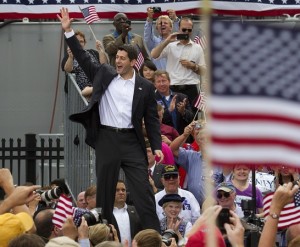Someone’s in Trouble
A better VP choice than Palin – but only just
In 2008, John McCain took a calculated risk. Knowing that his campaign was struggling to gain ground against Obama, McCain chose a largely unknown governor from Alaska to shake up the race. Unfortunately for McCain, his gamble backfired, and Palin became an easy target for ridicule. Four years later, when Romney became the GOP’s presidential candidate, even Republicans pointed to Palin as an example of a mistake that he must avoid in selecting a vice president.
Alas, Romney seems to be stuck in the same situation McCain was in 2008. He has consistently trailed Obama in polls and has failed to gain traction. A series of gaffes and missteps have hurt his campaign. Romney decided to go for a risky pick to try to shake up the race. Ryan may prove to be a brilliant choice – but I doubt it. Let’s focus on the positives, the negatives, and what the selection of Ryan reveals about the Romney campaign.
 Positives:
Positives:
Ryan counters many of Romney’s weaknesses. Romney is often perceived as robotic and artificial. Another negative perception is that Romney does not have strong principles and merely flip flops depending on the political winds (given his track record, that may be a logical conclusion). Ryan is the opposite. He is a rising young charismatic figure in the Republican Party, with strong fiscally conservative principles. He has stuck to unpopular proposals and is the mind behind much of the Republican Party’s current economic principles. Conservatives who remain uneasy about Romney will be reassured that Ryan is a “proper” conservative.
Negatives:
Unfortunately for Romney, selecting Ryan comes with serious drawbacks. He is the architect of Republican economic principles–principles that are deeply unpopular. Ryan’s opposition to medicare and social security will limit Romney’s appeal to the center-right. Ryan is another rich white face on Romney’s rich white ticket, so while he might shore up Romney’s base, it’s not clear that he will be able to draw in independents.
The real negatives however, are how the Ryan selection plays right into Obama’s hands in creating a narrative. Romney’s strategy for the election was simple: Talk about how bad the economy is, offer no concrete solutions, and thus give Obama no avenues for attack. Obama’s strategy is substantially harder: he has tried to present a fundamental difference between his vision of America’s future and Romney’s. Since Romney has been so vague, Obama’s reelection campaign has been limited to unsurprising accusations of his Republican opponent’s vision as only helping the rich.
Ryan suddenly makes Obama’s job a lot easier. Ryan has specific proposals to attack–deeply unpopular proposals. Additionally, Ryan’s policies almost certainly will favor the rich, which means Obama’s characterization of Romney is more likely to stick. Finally, Ryan’s main economic concern is deficit reduction. Americans seem to care far more about jobs. Obama can capitalize by presenting himself as the one concerned about getting Americans back to work, rather than about cutting social services.
Overall:
The selection of Ryan reveals that Romney feels that his campaign is in deep trouble–rightfully so, many argue. If Romney was satisfied with his current position, he would have picked a noncontroversial choice. If he felt his campaign was within easy striking distance, he would have selected a candidate who could carry a single swing state, but Romney is unlikely to carry Wisconsin. Ryan will fundamentally transform the race, which Romney apparently feels is necessary. Given how Romney’s election campaign is foundering, it is perhaps a necessary risk.